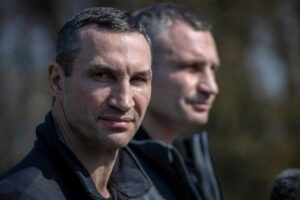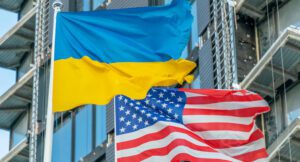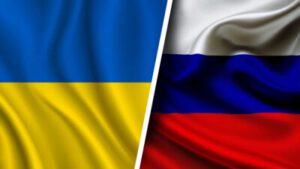
Volodymyr Klitschko, as part of the Ukrainian delegation, left for Germany, where negotiations are planned on political and economic support for Ukraine, Kyiv Mayor Vitaliy Klitschko said.
“Vladimir went with a delegation from Ukraine to meetings in Germany. Meetings are planned with German politicians and officials for political support of Ukraine – economic, humanitarian and military assistance to our state,” Vitali Klitschko wrote on his Facebook page
The mayor of Kyiv stressed the importance of consolidating all efforts to support the country.
“Today it is very important to unite all forces – both in Ukraine and to consolidate the positions and actions of the partner countries of our state,” he said.

US President Joe Biden, in a conversation with his Ukrainian counterpart Vladimir Zelensky, announced Washington’s plans to provide Ukraine with $500 million in direct financial assistance, according to a White House press release.
“President Biden informed President Zelensky that the United States intends to provide the Ukrainian government with $500 million in direct budget support,” the document says.
The two leaders also discussed how the US is working with allies and partners to identify additional opportunities to provide defense assistance to the Ukrainian military. It was also about how the United States is trying to “satisfy the basic needs of Ukraine in the field of security.”
In addition, Zelensky provided Biden with information on the state of negotiations between Ukraine and Russia, the press release also says.

Negotiations with the Russian delegation in an online format will resume on April 1, said the head of the Ukrainian delegation at the talks with the Russian Federation, David Arakhamia.
“At the talks in Turkey, we also announced that a meeting of the leaders of the two states was now required. The Russian delegation replied that first we need to have a more coordinated draft treaty. In a week we will work out what depends on the participants in the negotiation process,” he wrote in his telegram channel.
At the same time, Akharamiya expressed the assumption that after that the presidents of the countries would meet. At the same time, according to him, Ukraine insists that such a meeting take place not on the territory of Russia or Belarus.

Losses among civilians from February 24, 2022, when Russia started the war against Ukraine, to 24:00 on March 29, 2022, amounted to 3090 civilians (in the summary of the day before – 3039), including 1189 dead (1179), reports the Office of the High Commissioner UN Human Rights on Wednesday.
“UNHCHR believes that the real numbers are much higher, especially in government-controlled territory, and especially in recent days, as information from some places where there has been intense fighting has been delayed, and many reports are still awaiting confirmation,” it said. in the document.
According to him, this applies, for example, to Mariupol and Volnovakha (Donetsk region), Izyum (Kharkiv region), Popasna (Luhansk region), Trostyanets (Sumy region), where there are reports of numerous civilian casualties. They are subject to further verification and are not included in the above statistics.
“The majority of civilian deaths or injuries were caused by the use of explosive devices with a wide area of effect, including shelling from heavy artillery and multiple launch rocket systems, as well as rocket and air strikes,” the report says.
According to confirmed UN data, 239 men, 172 women, 34 boys and 17 girls died, while the sex of 57 children and 670 adults has not yet been determined.
Among the 1901 wounded, 36 girls and 30 boys, as well as 76 children, the sex of which has not yet been determined.
Compared to the previous day, four children were killed and eight more were injured, according to the UN.
OHCHR indicates that in Donetsk and Luhansk regions, as of midnight March 30, there were 328 (326) dead and 727 (716) injured in government-controlled territory, and 65 (62) dead and 243 (233) injured in territory controlled by self-proclaimed “republics”.
In other regions of Ukraine under government control (in Kyiv, as well as in Zhytomyr, Zaporozhye, Kiev, Sumy, Odessa, Mykolaiv, Kharkiv, Kherson, Dnepropetrovsk, Cherkasy and Chernihiv regions), the UN recorded 796 (791) dead and 931 (911) injured .
The report also states that, according to the Office of the Prosecutor General of Ukraine, as of 08:00 on March 30, 145 (144) children were killed and 222 (220) injured.
The increase in indicators in this report compared to the figures in the previous report should not be attributed only to new cases that occurred on March 29, since OHCHR also verified a number of cases that occurred in previous days during the day, the document specifies.

IAEA Director General Rafael Mariano Grossi called Wednesday meetings with high-ranking representatives of the Ukrainian government at the South Ukrainian NPP (SUNPP) very productive and announced the imminent arrival of experts at Ukrainian nuclear facilities.
“Teams of experts and additional safety equipment will arrive at Ukraine’s nuclear facilities very soon,” he tweeted at the end of the day.
The daily report of the organization indicates that at meetings with the Minister of Energy of Ukraine German Galushchenko, the heads of the nuclear regulator of Ukraine SNRIU Oleg Korikov and NNEGC “Energoatom” Petr Kotin, as well as the director of the South Ukraine NPP Igor Polovich, specific steps were considered to provide urgent assistance to Ukraine in protecting its nuclear facilities.
As reported, on March 30, Grossi visited South Ukraine NPP, where he met with representatives of the Ukrainian side. At a meeting with plant workers, he noted that the issue of the withdrawal of Russian troops from the Chernobyl and Zaporizhzhya NPPs “needs to be considered at different levels,” and it depends on the ceasefire agreements.

The German truck and bus manufacturer MAN was forced to send about 11,000 employees on unpaid leave due to the Russian military invasion of Ukraine.
The Volkswagen Group-owned company said on Wednesday that its facilities in Munich and Krakow, Poland, have been halted since March 14 due to the cessation of supplies of electrical wires produced at Ukrainian factories. At three other MAN sites, production volumes have been reduced, including at the engine plant in Nuremberg.
“Suppliers of electrical wiring for trucks cannot produce it at Ukrainian enterprises or can produce it in very limited quantities,” MAN said in a statement. “As a result, we could lose production for several weeks, which will sharply reduce output figures in the second quarter.”
The company said it has already started looking for additional sources of truck wiring harnesses in other countries.
“However, this will take several months,” said Alexander Vlaskamp, chief executive officer of MAN.
The company notes that its employees will be transferred to a reduced working hours scheme, in which MAN compensates them for 80% of lost income from both its own and state funds.
The problems of Ukrainian suppliers previously led to disruptions in the work of Volkswagen and BMW enterprises.
Most of the Ukrainian enterprises for the production of electrical wiring, located in the western part of the country, have resumed work, the Financial Times newspaper writes, citing representatives of several enterprises.
Thus, the German Leoni, which owns two factories in the west of Ukraine, has already reported that both of its enterprises have returned to work.
Other companies, including Aptiv and Kromberg & Schubert, have resumed production, FT sources say.
COMPONENTS, EUROPE, FACTORIES, MAN, MANUFACTURER, TRUCK, UKRAINE